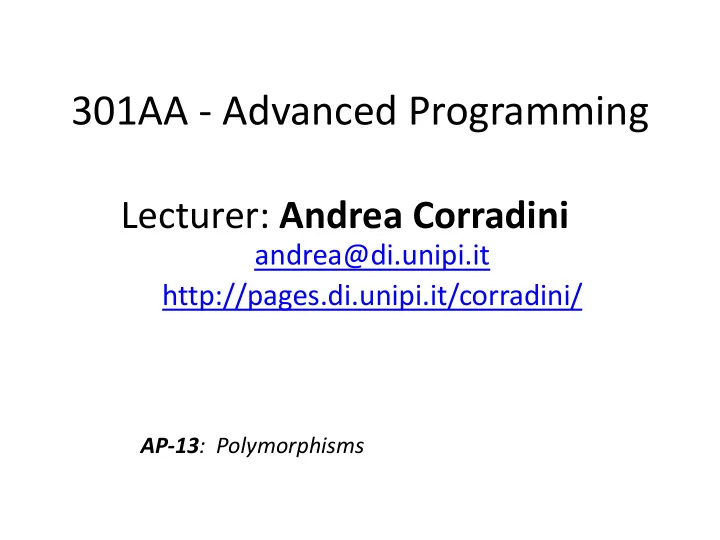

301AA - Advanced Programming Lecturer: Andrea Corradini andrea@di.unipi.it http://pages.di.unipi.it/corradini/ AP-13 : Polymorphisms
Outline • Polymorphism: a classification • Overloading • Coercion • Inclusion polymorphism • Overriding 2
Polymorphism • From Greek: πολυμορφος , composed of πολυ (many) and μορφή (form), thus “having several forms” • “Forms” are types • “Polymorphic” are function names (also operators , methods , …) • “Polymorphic” can also be types (parametric data types, type constructors, generics, …) – Usually as encapsulation of several related function names
Flavors of polymorphism • Ad hoc Related concepts : • Bounded • Coercion • Contravariant • Generics • Covariant • Inheritance • Inclusion • Macros • Overloading • Invariant • Parametric • Overriding • Universal • Subtyping • … • Templates • … 4
Universal vs. ad hoc polymorphism • With ad hoc polymorphism the same function name denotes different algorithms, determined by the actual types • With universal polymorphism there is only one algorithm: a single (universal) solution applies to different objects • Ad hoc and universal polymorphism can coexist
Binding time • The binding of the function name with the actual code to execute can be – at compile time – early, static binding – at linking time – at execution time – late, dynamic binding • If it spans over different phases, the binding time is the last one. • The earlier the better, for debugging reasons. 6
Classification of Polymorphism Coercion Coercion Implicit Parametric Explicit Bounded Universal Inclusion Covariant Polymorphism Invariant Contravariant Overriding Ad hoc Overloading Overloading
Ad hoc polymorphism: overloading • Present in all languages, at least for built-in arithmetic operators: +, *, -, … • Sometimes supported for user defined functions (Java, C++, …) • C++, Haskell allow overloading of primitive operators • The code to execute is determined by the type of the arguments, thus – early binding in statically typed languages – late binding in dynamically typed languages 8
Overloading: an example • Function for squaring a number: sqr(x) { return x * x; } • Typed version (like in C) : int sqr(int x) { return x * x; } • Multiple versions for different types: int sqrInt(int x) { return x * x; } double sqrDouble(double x) { return x * x; } • Overloading (Java, C++): int sqr(int x) { return x * x; } double sqr(double x) { return x * x; }
Overloading in Haskell • Haskell introduces type classes for handling overloading in presence of type inference • Very nice and clean solution, unlike most programming languages • We shall present this later in the course 10
Universal polymorphism: Coercion • Coercion : automatic conversion of an object to a different type • Opposed to casting , which is explicit double sqrt(double x){…} double d = sqrt(5) // applied to int • Thus the same code is applied to arguments of different types • Degenerate (and uninteresting) case of polymorphism 11
Classification of Polymorphism Coercion Implicit Parametric Explicit Bounded Universal Inclusion Covariant Polymorphism Invariant Contravariant Overriding Ad hoc Overloading
Inclusion polymorphism • Also known as subtyping polymorphism , or just inheritance • Polymorphism ensured by (Barbara Liskov’) Substitution principle : an object of a subtype (subclass) can be used in any context where an object of the supertype (superclass) is expected • [Java, C++,…] methods/functions with a formal parameter of type T accept an actual parameter of type S <: T ( S subtype of T ). • Methods/virtual functions declared in a class can be invoked on objects of subclasses, if not redefined… 13
Overriding • [Java] A method m(…) of a class A can be redefined in a subclass B of A . • Dynamic binding : A a = new B(); // legal a.m(…) // overridden method in B is invoked • Overriding introduces ad hoc polymorphism in the universal polymorphism of inheritance • Resolved at runtime by the lookup done by the invokevirtual operation of the JVM 14
Overloading + Overriding : C++ vs Java class A { class A { public: virtual void onFoo() {} public void onFoo() {} virtual void onFoo(int i) {} public void onFoo(int i) {} }; } class B : public A { class B extends A { public: virtual void onFoo(int i) {} public void onFoo(int i) {} }; } class C : public B { class C extends B { }; } class D { int main() { public static void main(String[] s) { C* c = new C(); C c = new C(); c->onFoo(); c.onFoo(); //Compile error – //Compiles !! // doesn't exist } 15 } }
Overriding + Overloading • [Java] Overloading is type-checked by the compiler • Overriding resolved at runtime by the lookup done by invokevirtual • [C++] Dynamic method dispatch: C++ adds a v-table to each object from a class having virtual methods • The compiler does not see any declaration of onFoo in C , so it continues upwards in the hierarchy. When it checks B , it finds a declaration of void onFoo(int i) , so it stops lookup and tries overload resolution, but it fails due to the inconsistency in the arguments. • void onFoo(int i) hides the definitions of onFoo in the superclass. • Solution: add using A::onFoo; to class B 16
Recommend
More recommend